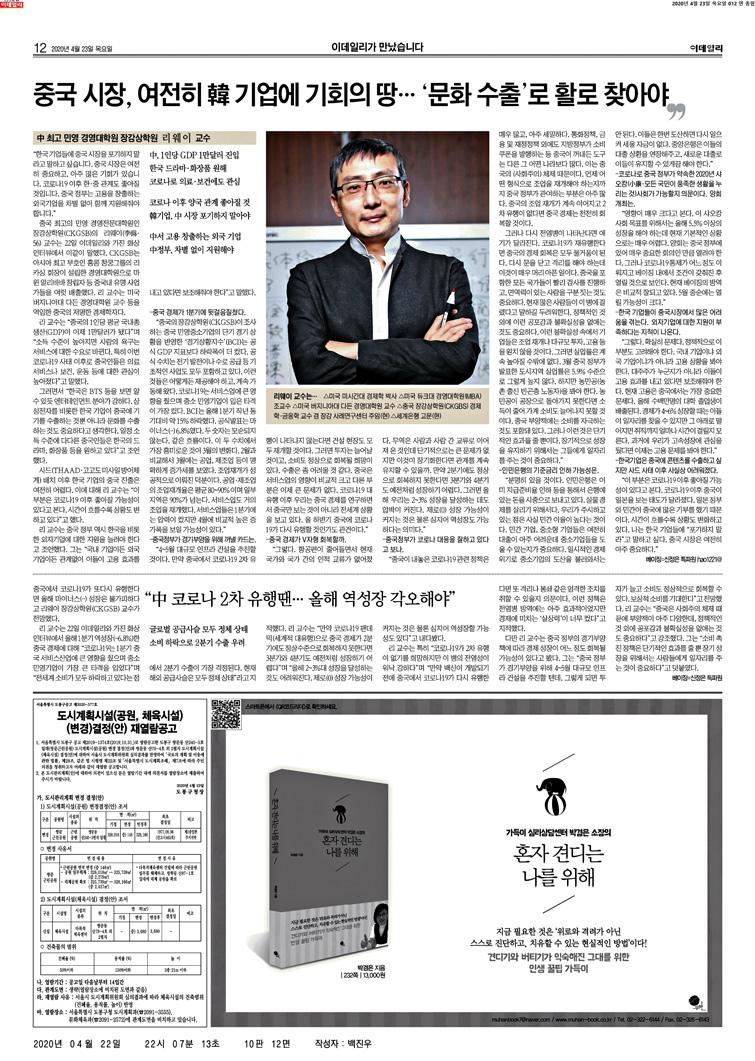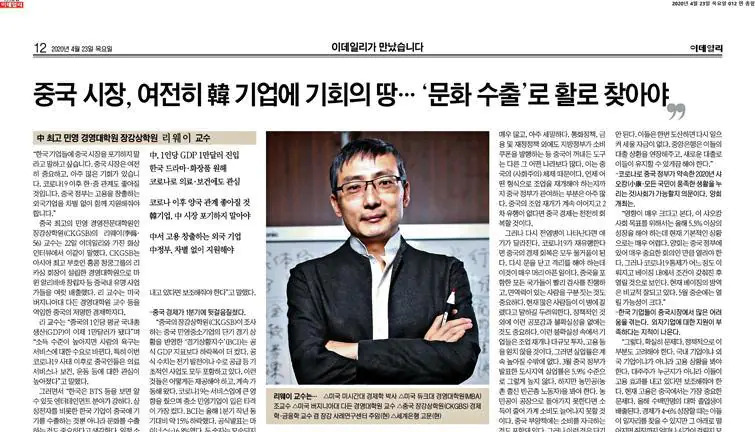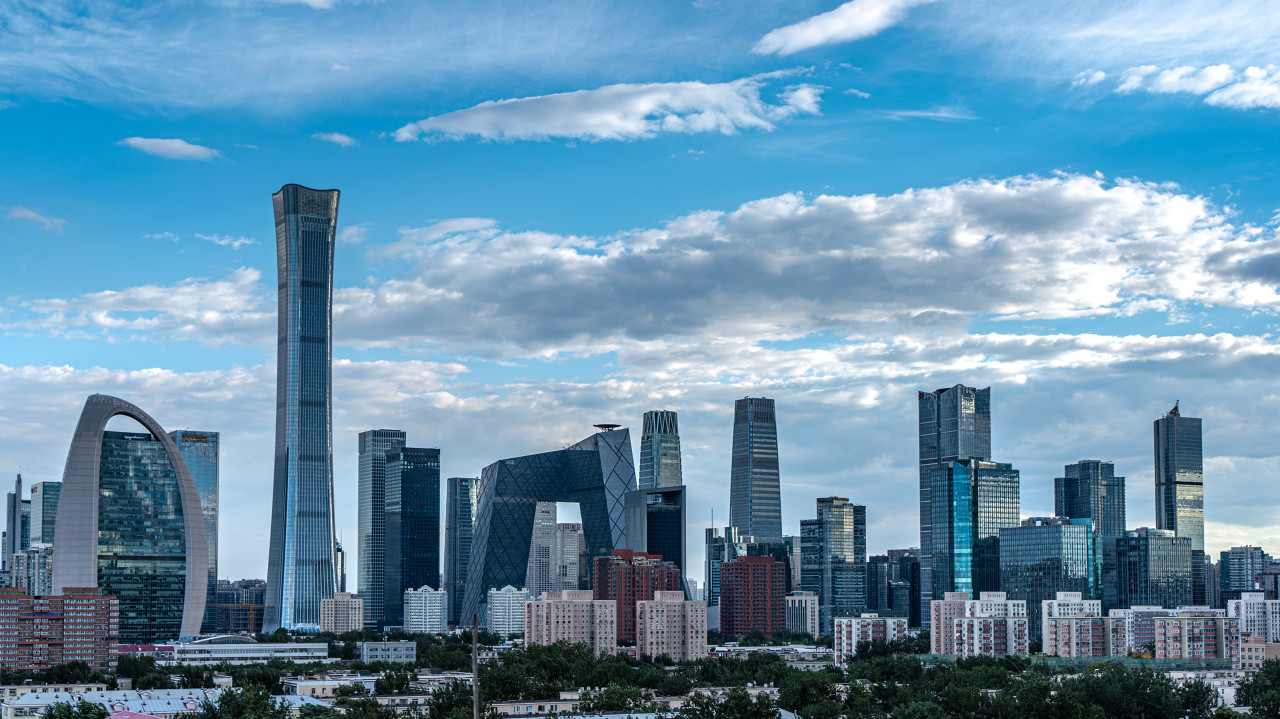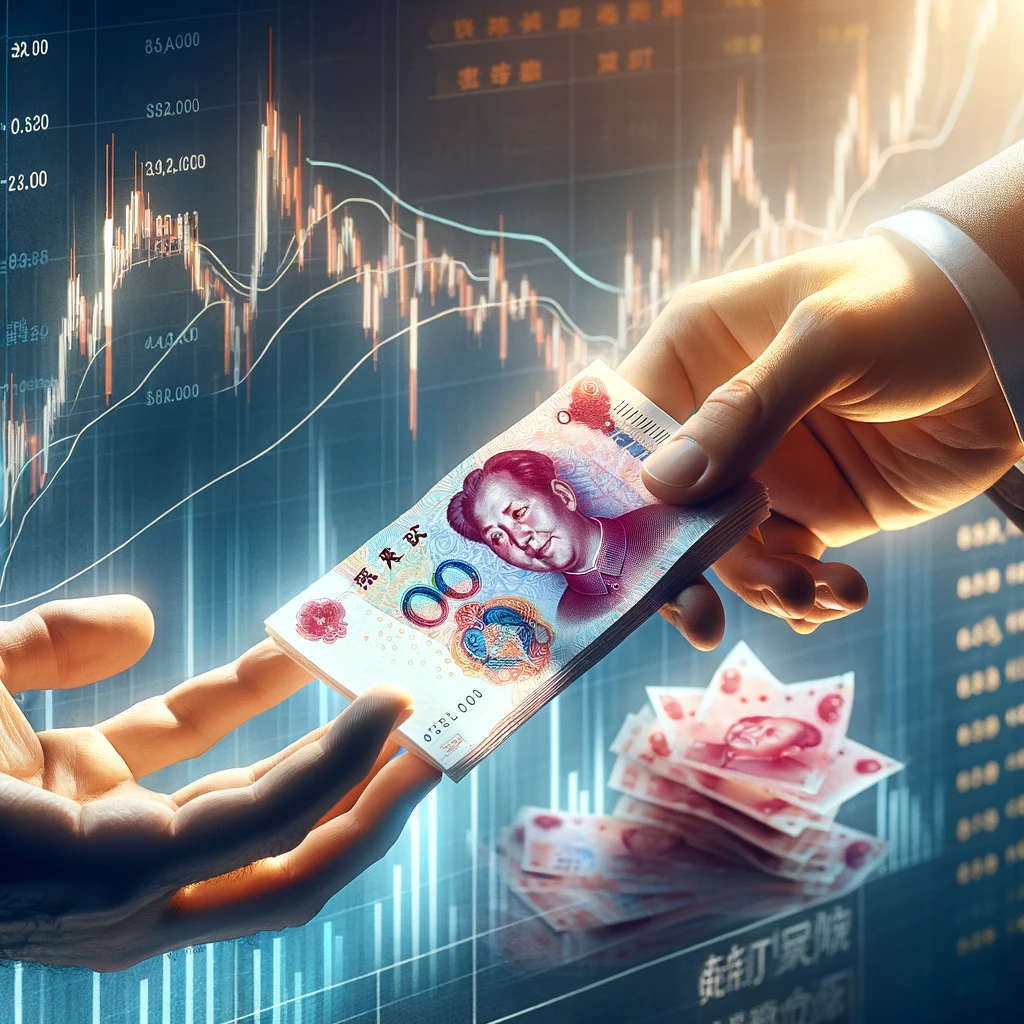“Korean companies shall not give up on the Chinese market…They can find a way out with cultural exports,” said Professor of Economics Li Wei from Cheung Kong Graduate School of Business (CKGSB), the best private graduate school of business in China, in a video interview with South Korean news media, E-Daily, at the end of April.
CKGSB has produced many famous entrepreneurs in China, including Jack Ma, the founder of Alibaba. Professor Li, a well-known economist in China, has taught at the University of Virginia, Darden School of Business.
Professor Li said, “GDP per capita of China exceeded 10,000 USD, and the human desire turns into the demand for services when income level increases. In particular, Chinese people started to take an interest in medical service, public health, and exercise because of COVID-19.” He advised that “Korea is powerful in the entertainment sector, as we can see with BTS. Besides Korean companies like Samsung Electronics that export electronic devices to China, it would be important for them to also export culture. Chinese people who have reached a certain income level are demanding Korean dramas and cosmetic products.”
After the THAAD deployment, Korean companies have been experiencing difficulties in China. Regarding this issue, Professor Li explained that “It is likely to improve after COVID-19. The circumstance is changing with time.”
Professor Li advised the Chinese government to increase support on foreign-funded companies, including Korea. He said, “The government needs to subsidize any companies that create jobs, regardless of nationality, because employment is the most critical issue at stake in China.”
Chinese economy took a step back in the first quarter.
The ’Business Conditions Index’ (BCI), a survey overseen by Professor Li Wei which gauges the business conditions of small and medium private businesses in China, showed an even greater drop than the official GDP indicator in the first quarter of 2020. The official indicator includes all infrastructure businesses like electric power generation and water supply. Such utilities must be provided whatsoever and have been operating without a stop throughout the coronavirus outbreak. COVID-19 had a huge impact on the service industry, with the biggest blow to small and medium private businesses. BCI dropped by about 15% in the first quarter of this year compared to the same period of last year. The official figures saw the Chinese economy contracting at -6.8%. The two figures show the same trend. Changes that occurred in March are most interesting. Compared to February, industrial and manufacturing businesses showed growth due to resumption of businesses. By April, 80-90% of industrial and manufacturing businesses had resumed operations. In some places, this rate even exceeded 90%. Many service businesses have also resumed their operations having been hit hard in the first quarter.
Does the Chinese government have an ace to stimulate the economy?
China will promote large-scale infrastructure construction in April and May. Unless a second wave of COVID-19 occurs in China, all efforts to reconstruct the economy will resume. Investment will increase, and there is hope for consumption to recover. Export, however, seems a bit problematic and may take longer to recover. China’s service industry is also slow to recover. Now that Covid-19 has become a pandemic, we are monitoring the global situation while studying the Chinese economy. The possible second wave of COVID-19 in the second half of the year could be a sticky point. As we wait for a vaccine to be developed, we can only hope that a second wave does not happen. But this disease is highly infectious so a reinfection is highly probable. Let’s not forget that the Spanish Flu of 1918 came to an end because most people became immune to it. If another wave of the pandemic were to take place, can we take strict measures like quarantine again? The policy was very effective in preventing the spread but had a very destructive effect on the economy.
Will the Chinese economy show a V-shaped recovery?
Yes. As flights have reduced, personal exchanges among nations have disappeared. International trade was continued by human exchanges. It would be okay in the short term, but can trade relations be maintained in a prolonged situation? If we do not recover the normal state in the second quarter, we would not be able to grow in the third and fourth quarters as before. That means we will have a hard time growing by 2~3% this year. The possibility of zero growth increases and even negative growth can happen. Looking at BCI, the private economy of China is likely to experience negative growth this year.
How is the Chinese government coping with COVID-19?
China has presented many detailed policies related to COVID-19, including currency policy, financial policy, fiscal policy, and coupons issued by local governments. The Chinese government decides when and how businesses will reopen. If businesses in China reopen smoothly and the second wave of COVID-19 does not occur, the Chinese economy will recover slowly. But of course, if we see reinfections, it will be a whole different story. While promoting economic recovery on the one hand, we must hope that the disease does not spread again. The economic recovery plan does not take into account the recurrence of COVID-19. All countries, including China, must increase testing and distinguish those who have immunity with those who do not. Amid such uncertainty, companies are not willing to resume business or engage in large-scale investment and employment. The unemployment rate is deemed to spike. The urban unemployment rate in March announced by the Chinese government was 5.9%, but we have to take a look at rural exodus workers. If they cannot return to factories, their income and household consumption will decrease. The expansionary policy of China includes the stimulation of consumption, but such a policy only has a short-term effect. We have to create jobs for these people in order to ensure long-term growth.
How likely is it for the People’s Bank of China to lower the base rate?
The People’s Bank of China is already pumping money out by lowering the reserve ratio to revive the real economy. We are paying attention to the fact that private interest rates are high. However, private companies and small and medium businesses are still having great difficulty getting a loan. Helping these small and medium companies is crucial. A temporary economic crisis should not bring about the bankruptcy of small and medium enterprises. They have no money to return once they go bankrupt. The central bank must extend the term of loans and give out new loans.
There is more doubt about the likelihood of the “Xiaokang” society (a society in which people live a fairly comfortable life) coming true in 2020, as previously promised by the Chinese government. What are we likely to see come from the annual Liang Hui (China’s parliamentary and consultative sessions)?
There is a huge impact. China needs to show a 5.5% growth this year to attain the Xiaokang society, but this growth rate seems difficult now. The two meetings must take place because they are vital for the Chinese government. However, they are going to be held in Beijing after we gain control over COVID-19. The disease is being prevented relatively well in Beijing. The meetings are likely to be held in mid-May.
Korean companies are having a hard time in the Chinese market. There is criticism that China lacks support for foreign-funded companies.
Yes, that is certainly a problem. We must consider this topic policy-wise. We have to think about employment status instead of whether a company is domestic or foreign. Instead of checking who the major stockholder is, the government should subsidize companies as long as they are creating employment. Employment is of the greatest importance in China right now. Millions of graduates will be looking for a job this year. They would have found a job if the economy was growing at a 4~6% rate. If the growth rate drops, it will be a difficult job market. We focused on rapid growth in the past. Now is time for us to look at employment.
Korean companies wish to export their cultural content to China, but it has become challenging after the THAAD deployment.
This issue should be improved after COVID-19. China began to have a different view of Japan because the Japanese government and its private sector offered donations to China. The circumstances are changing with time. I want to tell Korean companies “Don’t give up.” The Chinese market still matters a lot.























